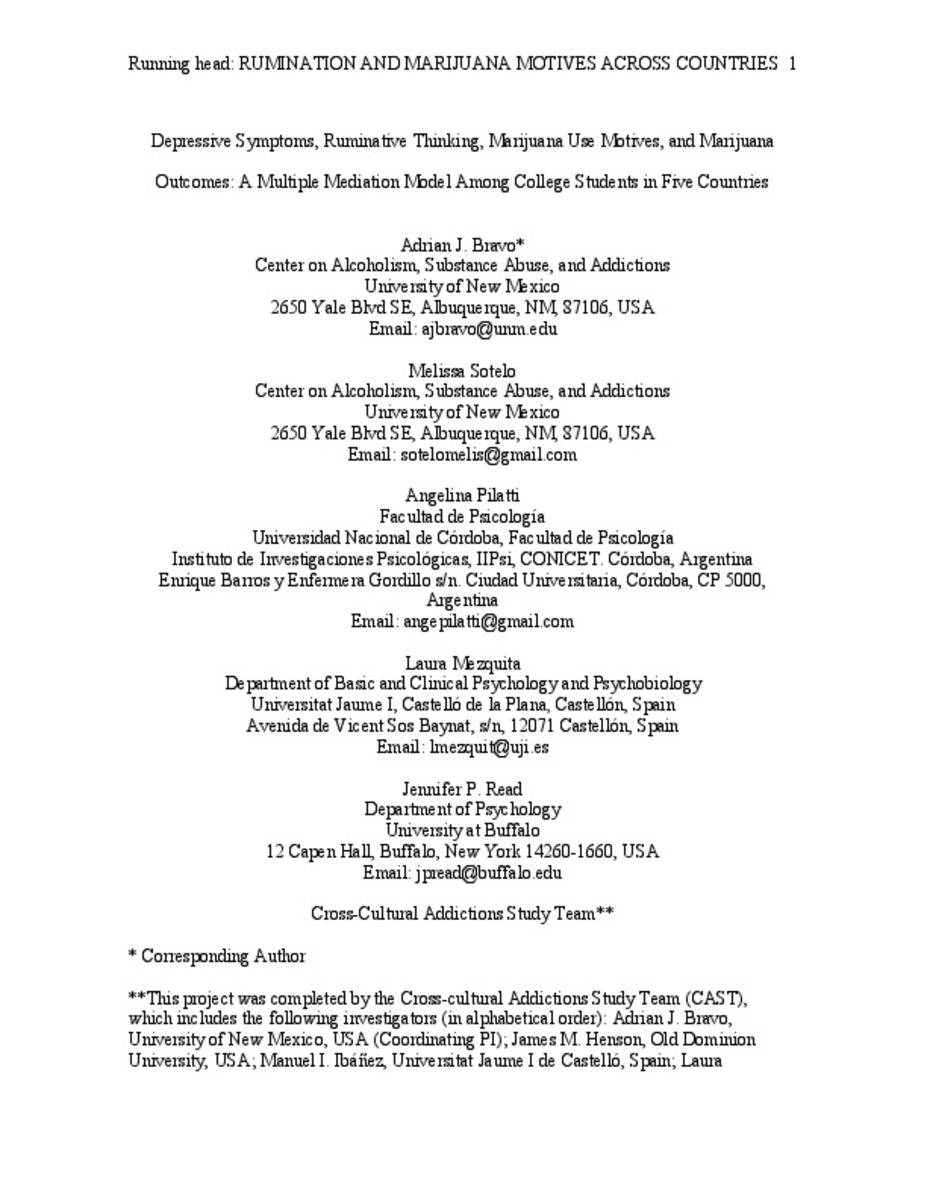| dc.contributor.author | Bravo, Adrián J. | |
| dc.contributor.author | Sotelo, Melissa | |
| dc.contributor.author | Pilatti, Angelina | |
| dc.contributor.author | Mezquita, Laura | |
| dc.contributor.author | Read, Jennifer P. | |
| dc.date.accessioned | 2019-12-02T10:35:13Z | |
| dc.date.available | 2019-12-02T10:35:13Z | |
| dc.date.issued | 2019-11 | |
| dc.identifier.citation | BRAVO, Adrían J.; SOTELO, Melissa; PILATTI, Angelina; MEZQUITA, Laura; READ, Jennifer P. (2019). Depressive symptoms, ruminative thinking, marijuana use motives, and marijuana outcomes: A multiple mediation model among college students in five countries. Drug and Alcohol Dependence, v. 204 | ca_CA |
| dc.identifier.uri | http://hdl.handle.net/10234/185267 | |
| dc.description | Treball Final de Grau en Medicina. Codi: MD1158. Curs acadèmic: 2018/2019. | ca_CA |
| dc.description.abstract | Background: Previous studies have evidenced that rumination and drinking motives may
mediate the association between depressive symptoms and alcohol outcomes. The present
study cross-culturally examined whether a similar mediation model may extend to
marijuana. Specifically, we tested distinct rumination facets (problem-focused thoughts,
counterfactual thinking, repetitive thoughts, and anticipatory thoughts) and marijuana use
motives (social, coping, expansion, conformity, enhancement) as double-mediators of the
paths from depressive symptoms to marijuana outcomes (use and consequences). Method:
A comprehensive mediation path model was tested in a cross-sectional sample of college
student marijuana users (n = 1,175) from five countries (U.S., Argentina, Uruguay, Spain,
Netherlands). Multi-group models were tested to determine if the proposed mediational
model was invariant across sex and different cultures/countries. Results: Depressive
symptoms and marijuana outcomes were indirectly associated through ruminative thinking
and marijuana motives. Specifically, higher depressive symptoms were associated with
higher problem-focused thoughts; which in turn were associated with: a) higher
endorsement of coping motives which in turn was associated with higher marijuana use and
related consequences and b) lower endorsement of enhancement motives which in turn was
associated with lower marijuana use and related consequences. The multi-group analyses
showed that the model was invariant across sex and the five countries. Conclusions: The
present research supports the existence of a universal (i.e., cross-national invariant)
negative affect regulation pathway to marijuana use/misuse similar to those previously
found with alcohol. Additional research is needed to confirm the role of enhancement
motives in the associations of depression, rumination and marijuana outcomes. | ca_CA |
| dc.format.extent | 30 p. | ca_CA |
| dc.format.mimetype | application/pdf | ca_CA |
| dc.language.iso | eng | ca_CA |
| dc.publisher | Elsevier | ca_CA |
| dc.relation.isPartOf | Drug and Alcohol Dependence (2019), v. 204 | ca_CA |
| dc.rights.uri | http://rightsstatements.org/vocab/CNE/1.0/ | * |
| dc.subject | Depression | ca_CA |
| dc.subject | Rumination | ca_CA |
| dc.subject | Marijuana use motives | ca_CA |
| dc.subject | Marijuana; cross-cultural | ca_CA |
| dc.title | Depressive symptoms, ruminative thinking, marijuana use motives, and marijuana outcomes: A multiple mediation model among college students in five countries | ca_CA |
| dc.type | info:eu-repo/semantics/article | ca_CA |
| dc.identifier.doi | https://doi.org/10.1016/j.drugalcdep.2019.107558 | |
| dc.relation.projectID | 1) Grant (T32-AA018108) from the National Institute on Alcohol Abuse and Alcoholism (NIAAA) in the United States; 2) Grant T32-AA018108. NIAAA had no role in the study design, collection, analysis or interpretation of the data, writing the manuscript, or the decision to submit the paper for publication; 3) Grant UJIA2017-18 and 4) UJI-B2017-74 from the Universitat Jaume I; 5) grant PSI2015-67766-R from the Spanish Ministry of Economy and Competitiveness (MINECO); 6) Data collection in Argentina was also supported by grants from the National Secretary of Science and Technology (FONCYT, grant number #PICT 2015-849) and 6) by grants from the Secretary of Science and Technology- National University of Córdoba (SECyT-UNC) | ca_CA |
| dc.rights.accessRights | info:eu-repo/semantics/openAccess | ca_CA |
| dc.relation.publisherVersion | https://www.sciencedirect.com/science/article/pii/S0376871619303357 | ca_CA |
| dc.type.version | info:eu-repo/semantics/publishedVersion | ca_CA |







